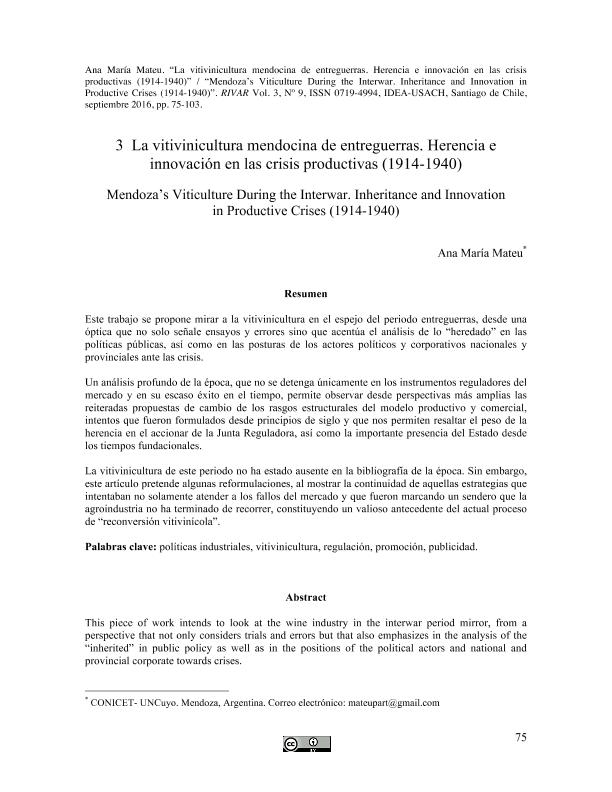Mostrar el registro sencillo del ítem
dc.contributor.author
Mateu, Ana Maria

dc.date.available
2018-04-27T21:00:04Z
dc.date.issued
2016-09
dc.identifier.citation
Mateu, Ana Maria; La vitivinicultura mendocina de entreguerras: Herencia e innovación en las crisis productivas (1914-1940); Universidad de Santiago de Chile. Instituto de Estudios Avanzados; RIVAR; 3; 9; 9-2016; 75-103
dc.identifier.issn
0719-4994
dc.identifier.uri
http://hdl.handle.net/11336/43776
dc.description.abstract
Este trabajo se propone mirar a la vitivinicultura en el espejo del periodo entreguerras, desde una óptica que no solo señale ensayos y errores sino que acentúa el análisis de lo “heredado” en las políticas públicas, así como en las posturas de los actores políticos y corporativos nacionales y provinciales ante las crisis. Un análisis profundo de la época, que no se detenga únicamente en los instrumentos reguladores del mercado y en su escaso éxito en el tiempo, permite observar desde perspectivas más amplias las reiteradas propuestas de cambio de los rasgos estructurales del modelo productivo y comercial, intentos que fueron formulados desde principios de siglo y que nos permiten resaltar el peso de la herencia en el accionar de la Junta Reguladora, así como la importante presencia del Estado desde los tiempos fundacionales. La vitivinicultura de este periodo no ha estado ausente en la bibliografía de la época. Sin embargo, este artículo pretende algunas reformulaciones, al mostrar la continuidad de aquellas estrategias que intentaban no solamente atender a los fallos del mercado y que fueron marcando un sendero que la agroindustria no ha terminado de recorrer, constituyendo un valioso antecedente del actual proceso de “reconversión vitivinícola”.
dc.description.abstract
This piece of work intends to look at the wine industry in the interwar period mirror, from a perspective that not only considers trials and errors but that also emphasizes in the analysis of the “inherited” in public policy as well as in the positions of the political actors and national and provincial corporate towards crises. A thorough analysis of the time, not only pointing at the regulators market instruments and their limited success in time, allows us to see from a broader perspective the repeated change proposals for the structural features of the production and trade model, attempts that were formulated since the beginning of the century and that allow us to highlight the burden of heritage in the actions of the Junta Reguladora and the significant presence of the State since the founding days. The viticulture of this period has not been absent in the literature of the time. However, this article aims to build some reformulations to show the continuity of those strategies that have not only tried to solve market failures and that were marking a path that agroindustry has not finished yet and constitute a valuable precedent of the ongoing “wine reconversion”.
dc.format
application/pdf
dc.language.iso
spa
dc.publisher
Universidad de Santiago de Chile. Instituto de Estudios Avanzados
dc.rights
info:eu-repo/semantics/openAccess
dc.rights.uri
https://creativecommons.org/licenses/by-nc-sa/2.5/ar/
dc.subject
Politicas Industriales
dc.subject
Vitivinicultura
dc.subject
Regulación
dc.subject
Promoción
dc.title
La vitivinicultura mendocina de entreguerras: Herencia e innovación en las crisis productivas (1914-1940)
dc.title
Mendoza’s viticulture during the interwar: Inheritance and innovation in productive crises (1914-1940)
dc.type
info:eu-repo/semantics/article
dc.type
info:ar-repo/semantics/artículo
dc.type
info:eu-repo/semantics/publishedVersion
dc.date.updated
2018-04-24T17:14:45Z
dc.journal.volume
3
dc.journal.number
9
dc.journal.pagination
75-103
dc.journal.pais
Chile

dc.journal.ciudad
Santiago
dc.description.fil
Fil: Mateu, Ana Maria. Consejo Nacional de Investigaciones Científicas y Técnicas. Centro Científico Tecnológico Conicet - Mendoza. Instituto de Ciencias Humanas, Sociales y Ambientales; Argentina. Universidad Nacional de Cuyo; Argentina
dc.journal.title
RIVAR
dc.relation.alternativeid
info:eu-repo/semantics/altIdentifier/url/http://www.revistarivar.cl/images/html/rivar9/art4.html
Archivos asociados
